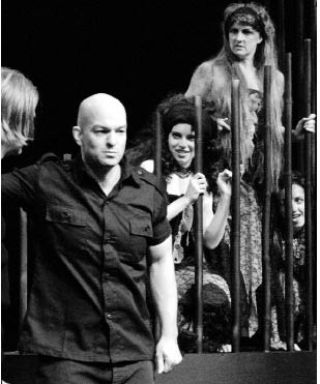What’s Up’s summer love/hate affair with Shakespeare culminates in a dark, red room with the three witches of “Macbeth.”
Consider it not so deeply.
That’s what Lady Macbeth tells her husband in Bainbridge Performing Arts’ wonderfully shady and timely portrayal of the ancient Shakesperian power struggle. Macbeth is tormented by the ghosts of guilt — daggers still in hand, blood on his shirt and voices in his head, having just killed the King to give himself the throne.
“These deeds must not be thought after these ways,” Lady Macbeth (played by Keridwyn Deller) goes on. “So it will make us mad.”
But Macbeth (Joseph Fountain) has already gone mad.
He’s brainsick. You can see it in his eyes.
Extremely ashamed of what he’s done, with the fear of being eternally unforgiven, he’s heard phantom voices crying throughout the house: “Sleep no more … Macbeth shall sleep no more!”
“Why, worthy thane,” Lady M. tries to snap him out it. “You do unbend your noble strength to think so brainsickly of things. Go get some water and wash this filthy witness from your hand.”
“The sleeping and the dead are but as pictures,” the wicked missus goes on to say.
And then there is a knocking at the door.
Enter: the fear of being found out and more knocking coming from every direction, getting louder and louder, making Macbeth more and more manic as he and Lady M. hurriedly retire to their chambers.
It’s in a similar state of madness which I write this article.
Not from having literally killed the King, but for the literal assassination which I’m about to assert: I think it’s time we pulled the plug on the Bard in community theater.
Don’t get me wrong, I’m not suggesting we erase him completely. There’s definitely much to learn from the greatest playwright in history. It’s just that it’s four centuries later.
Some of you may be saying, “Who’s this schmoe, talking trash on Shakespeare in community theater? He’s no expert.”
Which is true, I’ve never had theatrical training, never acted in a Shakespearian play and I haven’t studied the complete works of Shakespeare beyond the “Abridged.” But I am somewhat of a specialist on contemporary entertainment.
And over this past summer and early autumn, I did indulge in four different Kitsap community theater productions of Shakespeare — Arne Zaslove’s rock and roll version of “A Midsummer Night’s Dream” at the Kitsap Forest Theater, “Shakespeare in Hollywood” at the Bremerton Community Theater, “The Complete Works of William Shakespeare (Abridged)” at Western Washington Center for the Arts, and most recently Bainbridge Performing Arts’ adaption of “Macbeth” (which plays through Oct. 26).
Each one, some better than others, either modernized or adapted the script in some way to make the Bard’s work more “relevant in a contemporary setting” — reasoning which I heard from multiple people in justifying the adaptations.
It seems to me that if you are looking for theater that’s relevant in a contemporary setting, why not choose a contemporary work? (Probably, the audiences aren’t ready.)
But it seems that I’m not alone.
In a recent Stranger article, Seattle theater writer Brendan Kiley made a list of “Ten Things Theaters Need to Do Right Now to Save Themselves.”
No. 1 (in no particular order): “Enough with the (expletive deleted) Shakespeare already.”



